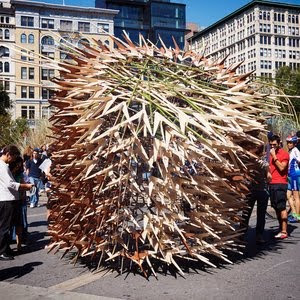 |
| Jerusalem Municipal Sukkah, 2008 (RahelSharon's Flickr) |
Thanks to all of you for your good wishes on my wedding. Now that I am settled back at Temple and we have made it through the High Holidays, I look forward to returning to my regular blogging schedule.
Tonight we begin the festival of
Sukkot. Coming only five days after Yom Kippur, I think there is definitely a sense every year that Sukkot sneaks up on us. We are exhausted, not ready to observe another major holiday. But this is really a shame, because as one of the Three Pilgrimage Festivals and as a holiday full of meaning and symbolic ritual, Sukkot is one of most significant days (a week, actually) on the Jewish calendar.
During this week of Sukkot, I want to share with you a number of texts and thoughts, so that even if you don't have the opportunity to shake a lulav, eat, and sleep in a sukkah each day, we can experience the course of the festival as a community. (I see this as one of the great potential benefits of online discussions for congregational life.)
The text I've chosen for today is from
Franz Rosenzweig. Rosenzweig (1886-1929) was a German-Jewish philosopher; he was also a master teacher, the founder of a tremendously influential institution for Jewish adult education in Weimar Germany. He wrote:
The Feast of Booths [Sukkot] is the feast of both wanderings and rest. In memory of those long wanderings of the past which finally led to rest, the members of the family do not have their merry meal in the familiar rooms of the house but under a roof which is quickly constructed, a makeshift roof with heaven shining through the gaps. This serves to remind the people that no matter how solid the house of today may seem, no matter how temptingly it beckons to rest and unimperiled living, it is but a tent which permits only a pause in the long wanderings through the wilderness of centuries. For rest, the rest of which the builder of the first Temple spoke, does not come until all these wanderings are at an end, and his words are read at this feast: "Blessed be He that has given rest unto His people."
Rosenzweig captures the sense in which Sukkot, like all Jewish holidays, concerns both the past and the future. Dwelling in the
sukkah, we reenact the wanderings of the Israelites in the wilderness. But we also acknowledge that we too are wanderers—that our lives, our relationships, even our community...are fragile. The "rest" Rosenzweig speaks of—quoting King Solomon's dedication of the Jerusalem Temple in
I Kings 8:56—is the ultimate achievement of peace and tranquility we still seek as a "Messianic Era." Sukkot is an opportunity to connect to that greater sense of history and meaning.
LEARNING OPPORTUNITY — For those of you who would like to begin Sukkot with some in-person study, there will be a Sukkot Adult Study Session at Temple TONIGHT (Wed., 9/22) at 7:00 p.m. in the Library. We have some great texts to discuss, and we will visit the sukkah for lulav-shaking and blessings. Please join us!
For discussion: Do you build a sukkah at your home? Tell us about it! (Click on the "comments" link below this post.)


